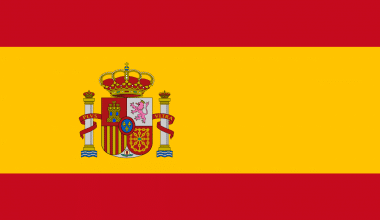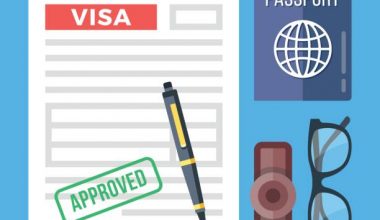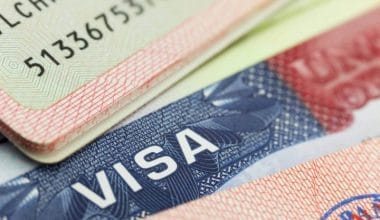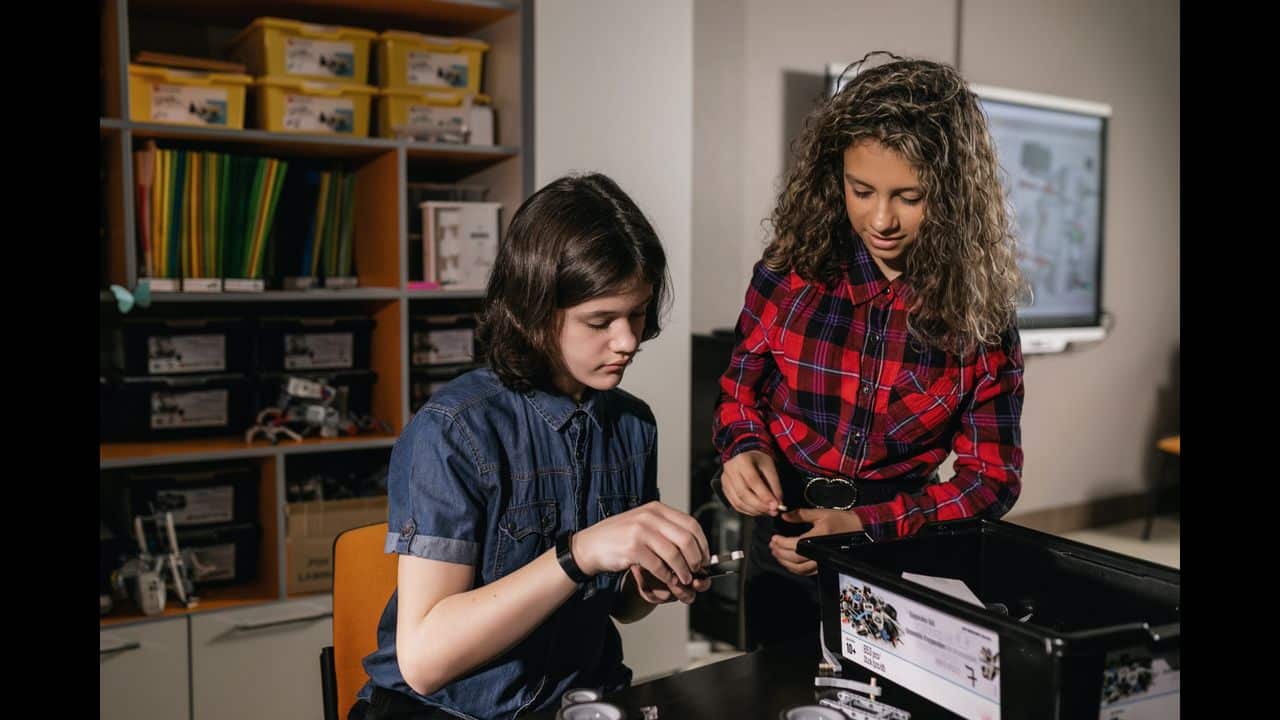When you go for a visa interview, it can be nerve-wracking. But preparation is everything, and if you’re prepared for some common questions about your educational background, you’ll be much more confident.
Are you worried about the student visa interviews and unsure of what to expect? That’s normal; most people are nervous when they do the interviews. In this article, we’ve gathered 30 possible and most common questions you may encounter in your student visa interview.
Table of contents
- How long is a student visa interview?
- How can I introduce myself in the Embassy interview?
- How can I be confident in a visa interview?
- What do visa officers check for a student visa?
- Can I wear jeans for U.S. visa interview?
- Common Student Visa Interview Questions in 2024
- 1. What is your program of study?
- 2. Why did you choose this field of study?
- 3. What are your career plans, and how does this program of study fit into these plans?
- 4. How will you fund your studies?
- 5. Who is meeting all of your funding needs?
- 6. How much money do you have available to pay for one year of study, and how did you come up with that amount?
- 7. How much money will it take to support yourself while studying?
- 9. Who reviewed your college/university selection? How did you select this institution?
- 10. What is so interesting about studying in the country, rather than in your country
- 11. Why don’t you apply for a scholarship if cost is an issue?
- 12. Have you graduated from or obtained a degree from another university? If yes, when did this happen, and where? Why didn’t you continue your studies there? If not, why not?
- 13. Your educational credentials do not match what is expected for entrance into graduate studies. Can you explain this apparent discrepancy in detail?
- 14. Where did you study in the past?
- 15. Why are you applying for a student visa?
- 16. Do you have a letter of recommendation from your university?
- 17. What is your favourite subject?
- 18. What is your current employment status?
- 19. What will you do after graduation?
- 20. Why did you choose this school/major?
- 21. Which of your classes is most interesting and why? Which is least interesting and why?
- 22. What are your hobbies?
- 23. How many schools did you apply to?
- 24. Why not study in other countries?
- 25. Tell us about the annual income of your sponsor
- 26. Do you have any siblings, and where do they live now?
- 27. Do you plan on returning to your home country?
- 28. How will you cope with the differences in culture and education
- 29. What city is your school cited?
- 30. What is the occupation of your sponsor?
- Bottom Line: Common Student Visa Interview Questions
- References
Isreal is one country that takes lesser time to process their visa. Read to learn How To Get an Isreal Student Visa | Step To Step Procedures.
How long is a student visa interview?
The student visa interview is usually a short, but important, meeting between a visa applicant and a U.S. consular officer. The officer will ask about the purpose of your visit, your education and work history, and other related questions. The student visa interview is typically around 15 minutes long.
How can I introduce myself in the Embassy interview?
When you go for your embassy interview, you will likely be asked to introduce yourself. This is your opportunity to tell the interviewer a little bit about yourself.
You can talk about your education, your work experience, and any other relevant information. It’s important to be prepared for this question and to have some good answers ready.
How can I be confident in a visa interview?
There is no one-size-fits-all answer to this question, as the level of confidence you need for a visa interview will vary depending on the embassy or consulate where you are applying.
However, some tips on how to be confident in a visa interview include doing your research on the country you are visiting, practising your answers to common questions, and dressing neatly and respectfully.
What do visa officers check for a student visa?
There are a few things that visa officers check for when reviewing student visa applications. They want to be sure that the applicant has a solid plan for their studies, and can afford to pay for their education.
Also, they want to make sure that the applicant has a good reason to leave their home country and come to the United States.
Can I wear jeans for U.S. visa interview?
You may also wear wide-legged dress pants or cropped hem pants as they also go well with any type of top while looking official and formal. Avoid jeans and leggings as these are often too informal for US visa attire.
Here below are some of the questions you’d need to answer at the US embassy during your interview with them.
Common Student Visa Interview Questions in 2024
1. What is your program of study?
This simple question indicates whether the person asking is familiar with the program.
Suppose you are applying for a student visa to study in Australia, for example, and are asked about your program of study.
In that case, you can ensure that your interviewer has read through all the paperwork you submitted and is aware of what you are planning to study.
2. Why did you choose this field of study?
This question is often asked because it’s an opportunity for the interviewer to learn more about your interests and motivation. This answer should be given in a short paragraph and should include:
- What is your background in this field?
- Why did you choose it as a career path or area of interest?
(Hint: You can use this question as an opportunity to talk about something interesting that has happened or that you’ve learned.)
- What are your goals, aspirations, or plans for the future in this field?
3. What are your career plans, and how does this program of study fit into these plans?
Think about these questions:
- What are your career plans? How does this program of study fit into these plans?
- Why did you choose to apply to the program you did? Why did you choose this particular university?
These questions can be tricky, but there are ways to answer them successfully. If you’ve chosen a specific field of study, explain how it fits into your career plan and why it’s vital for your future. For example: “I’m interested in becoming an engineer because I want to design bridges that can withstand earthquakes.
The engineering degree at UC Berkeley will help me achieve my goal by teaching me how concrete structures react under stress.”
4. How will you fund your studies?
You may be asked about your plans for funding your studies.
This is a prevalent question, and it’s important that you have a plan for how you will pay for your studies.
Be prepared to answer this question confidently, as the consular officer will be impressed by someone who has carefully considered this issue.
5. Who is meeting all of your funding needs?
This question determines if you have enough resources to pay for your education. Your sponsor may be a relative or friend, a scholarship program at the university, financial aid, or loans.
If you don’t already have enough money to pay for tuition, housing, and other expenses while studying abroad, this should be one of the first things you address when applying for a student visa.
6. How much money do you have available to pay for one year of study, and how did you come up with that amount?
One question that comes up often during student visa interviews is how much money you have available to pay for one year of study, and how did you come up with that amount?
This question can be tricky because there isn’t just one answer that works for everyone. Many factors are involved when determining how much money it takes to support yourself while studying abroad. These include:
- Your personal financial situation (bank account balance, credit card limits)
- Your monthly living expenses back home (rent/mortgage payments, utility bills, etc.)
- The likely cost of attending school in America (tuition fees plus everyday expenses)
7. How much money will it take to support yourself while studying?
The government wants to ensure that students applying for visas have enough money to support themselves throughout their stay.
They also want every student to have a financial backup plan if something goes wrong (like losing their job or having other unforeseen expenses).
8. Are there any courses required for your course of study that you cannot take at your university/college in (country)?
Simple answer: No courses are required for my course of study, which I cannot take at my university/college in (country).
9. Who reviewed your college/university selection? How did you select this institution?
This is a great question, one that many students don’t consider. Your interviewer wants to know what went into your decision-making process and whether or not you made an informed choice.
If you have researched schools for a long time, be prepared to talk about the factors that influenced your final decision.
Did the program have a good reputation? Was it more affordable than similar programs at other schools? How did it compare to other programs at other institutions?
What was it about the school that attracted you in terms of location, size, student body size, etc.?
10. What is so interesting about studying in the country, rather than in your country
The interviewer wants to know why you have chosen to study in the country and the advantages.
- What is so interesting about studying in the country, rather than any other country?
- How do your previous studies and work experience prepare you for this program?
- What do you think it will be like to live in a different country – both positive and negative aspects (e.g., culture shock)?
11. Why don’t you apply for a scholarship if cost is an issue?
This is a great question because it shows you’re thinking about your future. College is an investment, one that can pay off in big ways.
Scholarships are just one way to help reduce costs and make going to college more manageable for students who need assistance.
While scholarships are lovely, they do require a lot of work on your part. You’ll need to apply for specific scholarships, which can be difficult if your grades aren’t very good or you don’t have much experience writing essays and applications.
Scholarships also require additional paperwork, including resume-building exercises like writing a personal statement or letter of recommendation from someone who knows you well (like a teacher).
If you aren’t sure whether or not you’ll qualify for any scholarships, be sure to ask the interviewer what kind of information they want from applicants so that when the time comes around again next year, you’ll have everything ready in advance.
12. Have you graduated from or obtained a degree from another university? If yes, when did this happen, and where? Why didn’t you continue your studies there? If not, why not?
- Have you graduated from university or obtained a degree from another university? Why didn’t you continue your studies?
- Why did you choose to study in the US?
- What is the difference between studying in the US and studying in your home country?
- What are you looking forward to most about studying in the US?
- What are your career plans after you graduate from your program of study?
13. Your educational credentials do not match what is expected for entrance into graduate studies. Can you explain this apparent discrepancy in detail?
This is one of the most common questions asked at student visa interviews. It can be challenging to prepare for because it’s hard to know exactly what they will ask you and how they will phrase it.
The best way to approach this question is by taking time before the interview to think about your educational credentials, compare them with what’s expected for entrance into graduate studies, and explain in detail any discrepancies in your academic history that may have prevented you from completing requirements for admission.
A few examples of possible explanations:
- You have not completed the required degree (i.e., bachelor’s vs. master’s)
- You have not completed the required number of years of study (i.e., four years vs. five years).
14. Where did you study in the past?
This question is designed to see if you are eligible for a student visa. You should be able to provide information about the schools you attended, including the degree you received and the length of time spent there.
To enjoy seamless application as a Spain aspirant, check out How To Apply For a Student Visa In Spain | Interview, Requirements, Permit
15. Why are you applying for a student visa?
This question is asked to make sure that your reasons for wanting to study in the country are legitimate. If you have a specific purpose for coming here, such as attending a particular university or pursuing a specific field of study, mention that fact.
It’s also important to remember why you’re interested in studying in the United States; make sure your answers sound sincere and not rehearsed.
It’s important that what you say matches what appears on your application form and other documents submitted with it (such as transcripts). Make sure all information is correct before submitting anything.
16. Do you have a letter of recommendation from your university?
A letter of recommendation from a university is usually a good idea, but it’s not required. If you’re applying for a specific program that requires one and don’t have one, it’s best to let the school know so they can write one for you.
17. What is your favourite subject?
This is another straightforward question. Most students will have at least one favorite subject, and many people can name two or three favourites. If you say “history,” the officer may ask why it’s your favorite subject.
You can then talk about how exciting history is or how much you enjoy learning about different historical eras.
If you want to be a little more creative with the answer, try talking about academic achievement in a specific subject area that has given you pride or satisfaction.
18. What is your current employment status?
Your interviewer will want to know if you are currently employed or actively looking for a job. If the latter, is there a specific industry or field that interests you?
If not, why not? These questions may seem straightforward at first glance. Still, they can be tricky because applicants often assume what the interviewer means by “currently employed” and “actively looking for work.”
The key is to keep it simple in your response when asked these questions so that it’s easy for them to follow along with what they’re hearing from you (and remember what they heard).
19. What will you do after graduation?
The interviewer just wants to know your plans and how you will support yourself after graduation.
The best answer to this question is: “I plan on continuing my education. However, I will also be looking for work.”
If the student has no plans for further study or work after graduation, they should say: “For the next five years, my plan is…” You should also explain why you want to continue your studies or look for work in another country.
Are you low on cash? Read How to Get Student Visa Sponsorship | Step-by-Step Procedures to learn how to work on a budget.
20. Why did you choose this school/major?
Your interviewer wants to know why you chose this school and major, and they want to make sure that it makes sense. You should have a good answer for this question and the other questions on this list.
Your interviewer wants to know why you chose this school and major, and they want to make sure that it makes sense. You should have a good answer for this question and the other questions on this list.
21. Which of your classes is most interesting and why? Which is least interesting and why?
This question is about your interests, not the classes required to take. For example, if you are a student in a business school and a finance class is most interesting to you, then say what makes it so interesting.
Tell them why it’s important for your career goals or how it has helped shape who you are today.
22. What are your hobbies?
Socialize and have fun. Hobbies are a great way to relax, meet new people and learn something new.
You may want to include some hobbies in your country or region of origin. You can also talk about any hobbies that you have picked up recently.
23. How many schools did you apply to?
While this is a common question, it’s also one of the most important. The interviewers want to know that you’ve done your research and considered what kind of school will be the best fit for you.
If you apply to 10 schools and only one or two are really interested in you, then it will reflect poorly on you as a candidate.
24. Why not study in other countries?
There are many reasons why I want to study in the US. One of the main reasons is that it’s a very popular destination for study. I have chosen to study in [country] because it offers the best education and is a country I love.
25. Tell us about the annual income of your sponsor
This is a question that many students are asked during visa interviews. You need to understand your sponsor’s income statement and how much money they make annually.
26. Do you have any siblings, and where do they live now?
This question is asked to gauge how close you are to your family. It also allows the interviewer to see if you have a support system in place if something goes wrong while abroad.
27. Do you plan on returning to your home country?
When answering this question, it’s important to emphasize that you want to return home. It’s natural for someone who has been away from home for a while to feel homesick, and your interviewer will likely be understanding of this.
28. How will you cope with the differences in culture and education
You can start by telling the interviewer about your previous experience with cultural differences. If you’ve traveled or worked abroad, share what you learned from those experiences. You should also share how much you’d like to learn about the new culture and what opportunities it might provide for you.
29. What city is your school cited?
This is a simple, straightforward question. The interviewer asks because they want to know your connection to the school and where you’ll be moving. If you’re living in a more significant metropolis, this can also be a way for them to gauge whether or not you’ll be able to get around quickly.
China is one great country to study. Read this Sure Tips to get China Student VISA Fast
30. What is the occupation of your sponsor?
Your sponsor should be employed in a field relevant to the position you seek. If they are not, explain why you think they are the best person to sponsor you and what they can offer you that others cannot.
Bottom Line: Common Student Visa Interview Questions
In summary, the student visa interview is tailored to verify your statements in your application and your eligibility for a study visa. In most instances, it is not aimed explicitly at probing essential personal information.
References
Recommendations
DISCLOSURE: This post may contain affiliate links, meaning when you click the links and make a purchase, we receive a commission.






1 comment
Comments are closed.